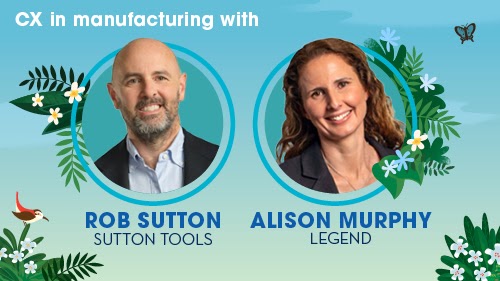Meeting the Challenge of Improving Customer Experience in Manufacturing



Many manufacturing companies are still playing catch up when it comes to understanding what’s involved in creating great customer experience. Here, industry leaders share their experience of delivering B2C style experiences in a B2B dominated sector.
Salesforce research across a range of business sectors has shown that customer experience is critical to business success. Customers increasingly want seamless, connected, personalised experiences with customer centricity an essential ingredient of top performing organisations.
The manufacturing sector, however, has traditionally been focused on B2B relationships often conducted through channel partners. With the end-user less immediately visible, their experience has not been top of mind.
Our latest State of Industrial Sales and Marketing report does show, however, that a focus on customer experience is finding its way into the sector, with 74% of surveyed respondents saying improving customer experience is a key requirement to achieving sales and marketing success.
Meeting the challenge of delivering CX in manufacturing
While improving CX might be key to success, it’s also considered a challenge by just under half of the survey respondents. The industry’s dependence on channel partners is part of what contributes to this challenge.
As Alison Murphy, Head of Digital Transformation at Legend, explained in our webinar, managing channel partners is complex but essential to bringing customer experience to the forefront. For example, Legend has relationships with both traders and non traders. The non traders buy through their channel partners. Part of Legend’s customer experience improvement strategy is to help those channel partners deliver better, B2C style experiences to their customers. “We want to build up an ecosystem of value in the digital space to deliver better customer experience and help us get closer to and get to know both sets of customers better.”
Dr Michael Valos, Senior Lecturer in the Department of Marketing at Deakin University, points out that such efforts can be hindered by manufacturers that think they can control their brand, access to customer information, and product development better by side-stepping their channel partners.
At Legend, however, building the confidence of channel partners that “we’re in it together” is critical, says Alison, to improving the end-user experience.
Rob Sutton, Commercial Director at Sutton Tools, has also seen up close how the complex relationship between B2B and B2C channels plays out and the role of digital technology in making it work.
When his company bought a business selling industrial cutting tools, the challenge lay in making over 5,000 SKUs easily accessible to end-user customers who expect to go online, order and take delivery within 48 hours. With the right digital platform, they were able to rise to the challenge. Manufacturing businesses have to meet that expectation, explains Rob, or they will struggle. “If you don’t do it, someone else will.”
The unexpected outcome was a concurrent upswing in channel partner sales. Developing the B2C platform had increased brand awareness in the market and resulted in growth across the board.
How customer experience informs every challenge
The State of Industrial Sales and Marketing report shows that manufacturers have identified several key challenge points including forecasting and order accuracy, sales effectiveness, proving marketing ROI, implementing sales and marketing technology, and aligning sales and marketing. Nearly half of respondents identified improving customer experience as a top challenge for industrial businesses.
As Alison Murphy explains, however, yes, customer experience is one of several challenges but it also drives all those other challenges. If you’re low on stock, CX suffers. If your sales team isn’t effective or your marketing is not reaching the right person and the right time with the right message, then your customers are not getting what they need. If your departments are poorly aligned then implementation of technology is difficult and a 360-degree view of the customer is not achievable.
With 52% of industrial sales and marketing professionals claiming the responsibility of customer experience lies with sales and customer service, for instance, it’s no wonder customer experience is viewed as a key challenge. We know from the latest State of the Connected Customer report that 76% of customers expect consistent interactions across departments. Manufacturers who break down silos and make customer service everyone’s job could find themselves holding the competitive edge.
Similarly, the State of Industrial Sales and Marketing report shows that 50% of survey respondents see IT as responsible for the technology that will enable improvements in customer experience. But an IT department that isn’t aligned with marketing and sales and doesn’t share a 360-degree view of the customer, is at risk of making technology choices that are not in the interest of the customer.
Improving customer experience, then, involves meeting all the challenges identified in the report. Aligning departments and implementing the digital solutions that allow a 360-degree view of the customer across all of them is critical to placing the customer at the centre of manufacturers. With that shared data in place, accurate forecasting can be addressed and relevant, timely messaging can form the foundation of successful marketing campaigns.
“One of the biggest enemies of our industry,” says Alison, “is to say ‘that’s how we’ve always done it.’”
Her advice for transforming the way industrial business approaches CX? “Be bold, test, and learn… When it comes to innovation, attack is your best defence.”
For more insights on the challenges and opportunities faced by industrial businesses, Download the State of Industrial Sales and Marketing Report
State of Industrial
Sales & Marketing 2020
A research report exploring industrial sales and marketing approaches, strategies and tactics in Australia
























